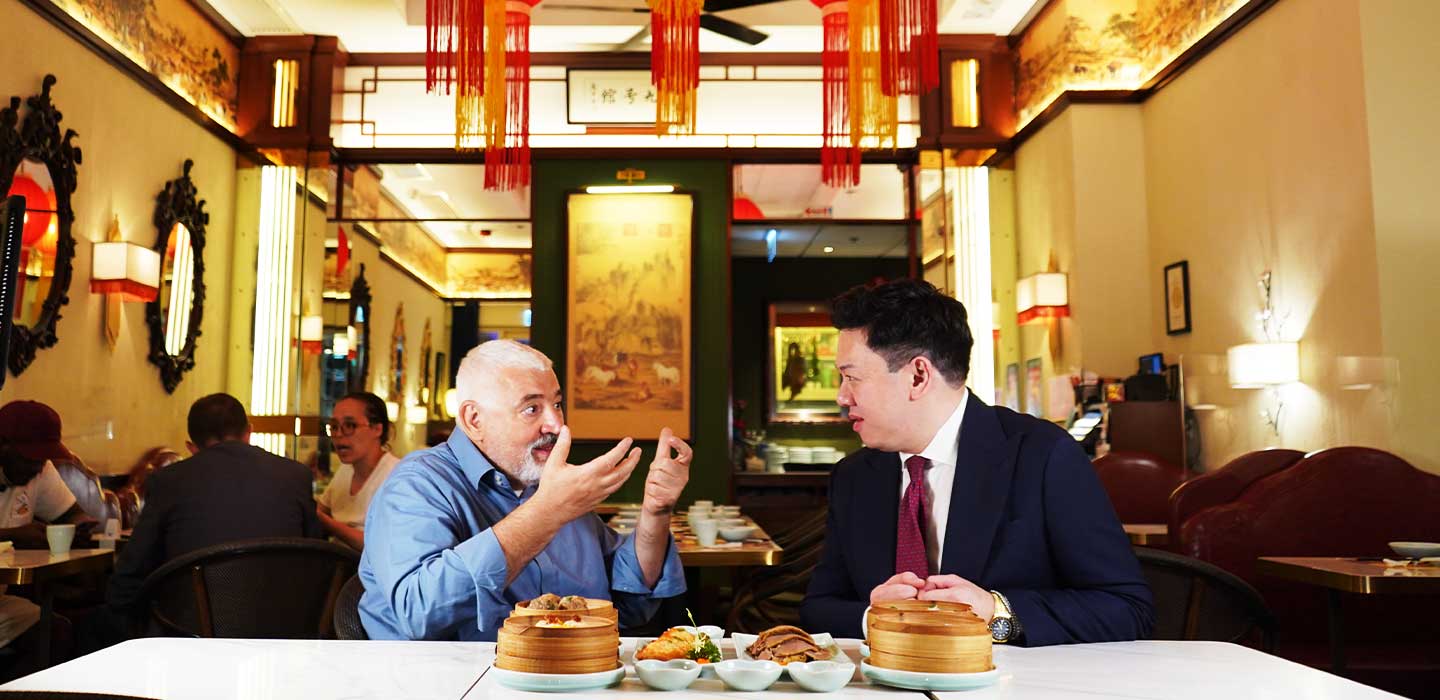我喜歡廣東菜,我喜歡潮州菜,我喜歡美食,我認為美食是重要的傳統,特別是在有那麼多不同地區的中國,中國美食是如此美麗。在廣東,食物烹製的技術太成熟了,比如說做潮州菜的技藝,他們把鵝浸泡在滷水裏一定時間,做成滷鵝,而滷水的味道會越滷越鮮美。
這其中有甚麼東西啟發了你的廚師生涯?吸引你的具體來說是甚麼?
首先是烹飪的技術。如果你看到如何蒸食物就會知道,對於廣東人來說,蒸是至關重要的。清蒸點心、清蒸海鮮、清蒸蛤蜊或其他,這就是一門技術。就像我說的,潮州有一項不同的、著名的烹飪技術。他們用香料和湯汁來煮鵝,而這些湯汁隨著烹飪的次數增加而不斷地累積鮮味。這太迷人了,令人驚嘆中國飲食文化是如何發展出這種味道和這種技術。
從這些技術、味道、食物中,是否能看到背後的人的故事?
當然。基本上,從食物中你能看到文化的深度,中國的食材種類繁多,他們必須發展出這麼多技術,來烹飪這麼多種類的食物,這就是為什麼中國食物有很深的技術。中國人有點像意大利人,他們烹煮雞腳、大腦、內臟和所有東西,這就是他們的文化。世界上只有少數幾個國家能夠發展這種文化。
聽到你把中國菜說成是高級菜餚很有意思,因為很多人在國外會把中國菜,看作是廉價的、現成的、外賣的食物。你認為為甚麼中國菜在向其他國家傳播它的價值和故事方面會出現這樣的問題?
我想中國菜的另一個要點是,他們知道如何使食物讓所有人負擔得起。這就像意大利人,我們以薄餅聞名,因為它是負擔得起的食物。例如法國人更以講究聞名,但是意大利菜我們必須……有點像中國菜,你需要填飽肚子。所以,你要考慮用甚麼材料,然後以一種廉價的做法讓人們都能填飽肚子,所以這就是為甚麼,也許中國菜或意大利菜更被視為家庭餐館,而不是昂貴的餐廳,我想這就是原因。
中國與食物有著非常複雜的關係,像你所提到的美食是一個巨大的需求。在中國,有很長的貧窮和飢餓的歷史,你認為這種需求和「填飽」肚子的需求之間有什麼聯繫嗎?
當然,當然,肯定是這樣。你知道,我們說飢餓能刺激想像力,所以你必須學會如何吃一切,但與此同時,也有君主、皇帝在吃最好的佳餚。在中國歷史上這兩種食物都在發展--貴族菜和農民的休閒菜,這和意大利一樣。
I love Cantonese food, I love Chiu Chow food, I love food. And I think it's a big tradition, especially the different regions of China and the food is so beautiful. Cantonese, so settled. The technique of Chiu Chow food, poach the goose at certain times, the stock, they refresh the stock every day.
Is there something about that that inspires your own career as a chef? And what specifically fascinates you in the way you say it does?
Well, first the technique. You know, if you see the steaming... for Cantonese, steam is crucial. Steaming dim sum, steaming seafood steaming clams, or whatever. So that's the technique. Chiu Chow has a different, famous technique. They poach the goose with the spice and refreshing the stock... and the stock goes on and on and on. It's fascinating. It's just amazing how the culture developed this kind of flavor and this kind of technique.
Do the techniques, the flavors, the foods... does it tell you something about the people behind it?
Of course. It's basically, it's the deepness of the culture you can see. Chinese have to develop so many techniques to cook so many kinds of food. That's why there is a deep technique in Chinese food. But Chinese, a bit like Italian, they cook the chicken feet, the brain, the guts and everything, that's culture, you know. Only a few countries in the world can develop this culture.
It's interesting to hear you speak about Chinese cuisine in such high terms as an haute cuisine, because many people abroad will see Chinese cuisine as cheap, ready-made, take away. Why do you think Chinese food has had that problem in communicating its value and story in other countries?
I guess another point of Chinese cuisine, they know how to make it affordable. It's like Italian, we are famous for pizza, because it's affordable food. For example, the French are more famous for gourmet cuisine. But Italian food, we have to... a bit like Chinese food... you need to fill up the stomach. So, you think about what to use, and then fill up the stomach in an inexpensive way as well. So, that's why maybe as Chinese or Italian, they are seen more as a family restaurant than an expensive restaurant, that's the reason, I think.
China has had a very complex relationship with food. One of the great needs which perhaps you are referencing is the long history of poverty and hunger over many, many centuries in China. Do you think there's a link between that need and the need also to "fill up" the stomach?
Of course, of course, definitely. You know, we are saying hunger stimulates your imagination, so, you have to learn how to eat everything. But at the same time, you had the monarchy, the kingdom, they eat the best of the best. Both cuisines develop, the noble cuisine and the casual cuisine for the peasants, same-same as in Italy.

